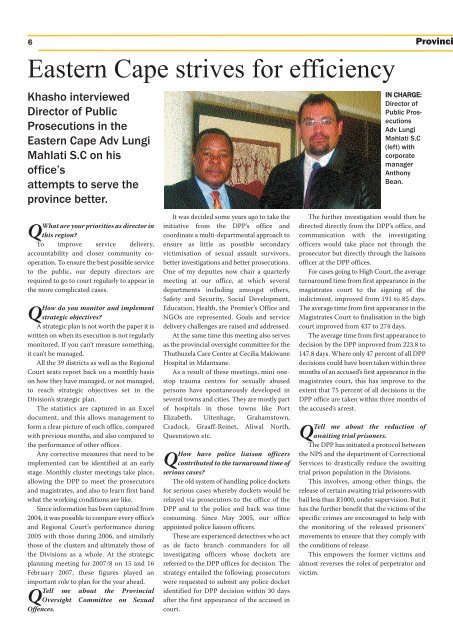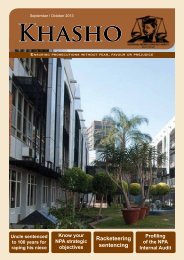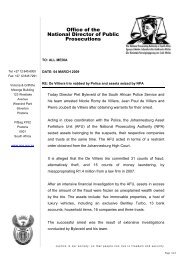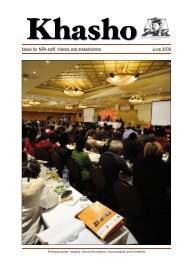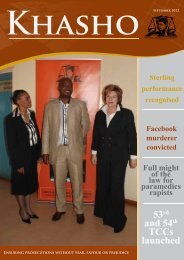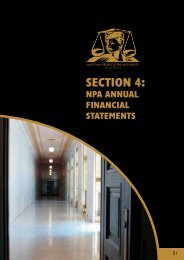Khasho February 2007 - National Prosecuting Authority
Khasho February 2007 - National Prosecuting Authority
Khasho February 2007 - National Prosecuting Authority
Create successful ePaper yourself
Turn your PDF publications into a flip-book with our unique Google optimized e-Paper software.
6<br />
Eastern Cape strives for efficiency<br />
<strong>Khasho</strong> interviewed<br />
Director of Public<br />
Prosecutions in the<br />
Eastern Cape Adv Lungi<br />
Mahlati S.C on his<br />
office’s<br />
attempts to serve the<br />
province better.<br />
IN CHARGE:<br />
Director of<br />
Public Prosecutions<br />
Adv Lungi<br />
Mahlati S.C<br />
(left) with<br />
corporate<br />
manager<br />
Anthony<br />
Bean.<br />
Provinci<br />
QWhat are your priorities as director in<br />
this region<br />
To improve service delivery,<br />
accountability and closer community cooperation.<br />
To ensure the best possible service<br />
to the public, our deputy directors are<br />
required to go to court regularly to appear in<br />
the more complicated cases.<br />
QHow do you monitor and implement<br />
strategic objectives<br />
A strategic plan is not worth the paper it is<br />
written on when its execution is not regularly<br />
monitored. If you can’t measure something,<br />
it can’t be managed.<br />
All the 39 districts as well as the Regional<br />
Court seats report back on a monthly basis<br />
on how they have managed, or not managed,<br />
to reach strategic objectives set in the<br />
Division’s strategic plan.<br />
The statistics are captured in an Excel<br />
document, and this allows management to<br />
form a clear picture of each office, compared<br />
with previous months, and also compared to<br />
the performance of other offices.<br />
Any corrective measures that need to be<br />
implemented can be identified at an early<br />
stage. Monthly cluster meetings take place,<br />
allowing the DPP to meet the prosecutors<br />
and magistrates, and also to learn first hand<br />
what the working conditions are like.<br />
Since information has been captured from<br />
2004, it was possible to compare every office’s<br />
and Regional Court’s performance during<br />
2005 with those during 2006, and similarly<br />
those of the clusters and ultimately those of<br />
the Divisions as a whole. At the strategic<br />
planning meeting for <strong>2007</strong>/8 on 15 and 16<br />
<strong>February</strong> <strong>2007</strong>, these figures played an<br />
important role to plan for the year ahead.<br />
QTell me about the Provincial<br />
Oversight Committee on Sexual<br />
Offences.<br />
It was decided some years ago to take the<br />
initiative from the DPP’s office and<br />
coordinate a multi-departmental approach to<br />
ensure as little as possible secondary<br />
victimisation of sexual assault survivors,<br />
better investigations and better prosecutions.<br />
One of my deputies now chair a quarterly<br />
meeting at our office, at which several<br />
departments including amongst others,<br />
Safety and Security, Social Development,<br />
Education, Health, the Premier’s Office and<br />
NGOs are represented. Goals and service<br />
delivery challenges are raised and addressed.<br />
At the same time this meeting also serves<br />
as the provincial oversight committee for the<br />
Thuthuzela Care Centre at Cecilia Makiwane<br />
Hospital in Mdantsane.<br />
As a result of these meetings, mini onestop<br />
trauma centres for sexually abused<br />
persons have spontaneously developed in<br />
several towns and cities. They are mostly part<br />
of hospitals in those towns like Port<br />
Elizabeth, Uitenhage, Grahamstown,<br />
Cradock, Graaff-Reinet, Aliwal North,<br />
Queenstown etc.<br />
QHow have police liaison officers<br />
contributed to the turnaround time of<br />
serious cases<br />
The old system of handling police dockets<br />
for serious cases whereby dockets would be<br />
relayed via prosecutors to the office of the<br />
DPP and to the police and back was time<br />
consuming. Since May 2005, our office<br />
appointed police liaison officers.<br />
These are experienced detectives who act<br />
as de facto branch commanders for all<br />
investigating officers whose dockets are<br />
referred to the DPP offices for decision. The<br />
strategy entailed the following; prosecutors<br />
were requested to submit any police docket<br />
identified for DPP decision within 30 days<br />
after the first appearance of the accused in<br />
court.<br />
The further investigation would then be<br />
directed directly from the DPP’s office, and<br />
communication with the investigating<br />
officers would take place not through the<br />
prosecutor but directly through the liaisons<br />
officer at the DPP offices.<br />
For cases going to High Court, the average<br />
turnaround time from first appearance in the<br />
magistrates court to the signing of the<br />
indictment, improved from 191 to 85 days.<br />
The average time from first appearance in the<br />
Magistrates Court to finalisation in the high<br />
court improved from 437 to 274 days.<br />
The average time from first appearance to<br />
decision by the DPP improved from 223.8 to<br />
147.8 days. Where only 47 percent of all DPP<br />
decisions could have been taken within three<br />
months of an accused’s first appearance in the<br />
magistrates court, this has improve to the<br />
extent that 75 percent of all decisions in the<br />
DPP office are taken within three months of<br />
the accused’s arrest.<br />
QTell me about the reduction of<br />
awaiting trial prisoners.<br />
The DPP has initiated a protocol between<br />
the NPS and the department of Correctional<br />
Services to drastically reduce the awaiting<br />
trial prison population in the Divisions.<br />
This involves, among other things, the<br />
release of certain awaiting trial prisoners with<br />
bail less than R1000, under supervision. But it<br />
has the further benefit that the victims of the<br />
specific crimes are encouraged to help with<br />
the monitoring of the released prisoners’<br />
movements to ensure that they comply with<br />
the conditions of release.<br />
This empowers the former victims and<br />
almost reverses the roles of perpetrator and<br />
victim.


